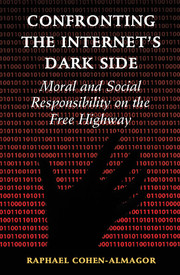Book contents
- Frontmatter
- Dedication
- Contents
- Acknowledgments
- List of Abbreviations
- Introduction
- 1 Historical Framework
- 2 Technological Framework
- 3 Theoretical Framework
- 4 Agent's Responsibility
- 5 Readers' Responsibility
- 6 Responsibility of Internet Service Providers and Web-Hosting Services, Part I: Rationale and Principles
- 7 Responsibility of Internet Service Providers and Web-Hosting Services, Part II: Applications
- 8 State Responsibility
- 9 International Responsibility
- Conclusion
- Glossary
- Selected Bibliography
- Index
3 - Theoretical Framework
Published online by Cambridge University Press: 05 July 2015
- Frontmatter
- Dedication
- Contents
- Acknowledgments
- List of Abbreviations
- Introduction
- 1 Historical Framework
- 2 Technological Framework
- 3 Theoretical Framework
- 4 Agent's Responsibility
- 5 Readers' Responsibility
- 6 Responsibility of Internet Service Providers and Web-Hosting Services, Part I: Rationale and Principles
- 7 Responsibility of Internet Service Providers and Web-Hosting Services, Part II: Applications
- 8 State Responsibility
- 9 International Responsibility
- Conclusion
- Glossary
- Selected Bibliography
- Index
Summary
We do not act rightly because we have virtue or excellence, but we rather have those because we have acted rightly.
–Aristotle
First, Do No Harm.
–Vinton G. Cerf
The Internet provides cheap, virtually untraceable, instantaneous, anonymous, uncensored distribution that can be easily downloaded and posted in multiple places. The transnational nature of the World Wide Web, its vast content, the lack of central management or coordination, and the fact that routing computers do not retain copies of the packets they handle provide ample opportunities for people to exploit the Net's massive potential to enhance partisan interests, some of which are harmful and antisocial. Although a relatively small number of people use the Net to harm others, they undermine people's sense of trust in the Net.
Luciano Floridi argues that we are now experiencing the fourth scientific revolution. The first was that of Nicolaus Copernicus (1473–1543), the astronomer who formulated a scientifically based, heliocentric cosmology that displaced the Earth – and hence, humanity – from the center of the universe. The second was that of Charles Darwin (1809–1882), who showed that all species of life have evolved over time from common ancestors through natural selection, thus displacing humanity from the center of the biological kingdom. The third was that of Sigmund Freud (1856–1939), who recognized that the mind is also unconscious and subject to the defense mechanism of repression; thus, we are far from having Cartesian minds entirely transparent to ourselves. And now, in the information revolution, we are in the process of dislocation and reexamination of humanity's primary nature and role in the universe.
Floridi argues that while technology keeps growing, we must start digging deeper to expand and reinforce our conceptual understanding of the information age – its nature, its less visible implications, and its impact on human and environmental welfare. Doing so will enable us to anticipate difficulties; identify opportunities; and resolve challenges, conflicts, and dilemmas.
Floridi has made many contributions in his attempts to “dig deeper.”
- Type
- Chapter
- Information
- Confronting the Internet's Dark SideMoral and Social Responsibility on the Free Highway, pp. 49 - 83Publisher: Cambridge University PressPrint publication year: 2015



